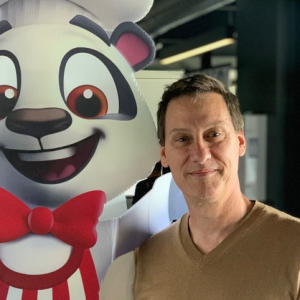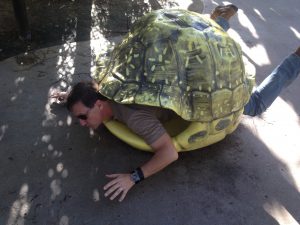Bring Out Your Devs! Developer Spotlight: George Rothrock

Bring Out Your Devs is an IGDA San Diego blog series, where we highlight some amazing developers in our community. This time we interviewed George Rothrock, a producer at Jam City and long time IGDA member. He’s been in the game industry for over 24 years, working as a game designer, artist, producer, and professor.

Tell me about yourself!
I grew up playing games of all kinds, including coin-drop arcade games, and I’ve played console video games since going to work at Sony in 1996, after the original Playstation launched. I’ve worked on four PS platforms as well as iOS/Android and have seen the industry change a lot. I served in a number of roles, starting out as an artist at Sony, and growing into the roles of producer, designer, and publisher. And I’ve worked on a lot of aspects of development, including cinematics and motion capture.
I saw you had a couple history degrees but then jumped to art, producing, designing, and teaching. What prompted these transitions?
I really enjoy the narrative of history. I appreciate the flow of the story, and I had some great history teachers. When I started grad school to study media history (like radio and mass media), I learned about how stories were created and commercialized in advertisements, propaganda, and so on. My mentor inspired me to make some interactive work by showing history in a media-centric way. The University of San Diego had a connection with Old Town, so I got a fellowship to do a touch screen experience about the history of Old Town San Diego. That’s where I learned 3D modeling, Macromind Director programming to do the interactive bit, and used Photoshop and Premiere for basic graphics and video.
After I put this together, I met the lead artist on GameDay (Sony’s professional football game). I jokingly asked for a job, she asked for a demo of that work, and that got me on board. Starting as a 2D texture artist, I painted a lot of 8-bit textures. I left grad school for the lure of the exciting and demanding world of video games. In 2006 I began teaching game development part-time, so I eventually finished the degree in 2014. My thesis was on the history of the video game industry in San Diego
I did art for my first five titles, learning 3D art on the job, but I was never classically trained. By the time the Playstation 2 came out, the quality of art became very high, and I knew I wasn’t that good.
I was more interested in the bigger picture. So I became a producer, which meant working directly with the development team. I worked on four more games as a producer, and another few titles that still had some of my art. But I was always interested in design, and there were a lot of changes in the studio then, so I eventually stepped over into a designer role before returning to producing.
As for the rest of my experience, when Sony closed the Redzone Studio in 2005, I was looking for a job. A colleague that was teaching at the Art Institute just left, so I went down and interviewed. After doing an audition gig, I’ve been part-time teaching ever since. I have taught at a couple of different colleges, worked for a few years at Qualcomm, then returned to a studio in 2011. I am currently a producer at Jam City.
Would you recommend video game school?
It depends on your aspirations. Video game specific degrees can be like vocational programs; they focus on teaching skills that are directly applicable, like how to use certain software. They’re good as long as they’re reflective of current marketable skills. For example, AAA studios weren’t hiring after 2008, so education had to train developers and artists to adapt to the business landscape, training them in more relevant skills. The smartphone revolution began in 2007, as the bottom was falling out of console development so there was a lot of change.
To me, video game school is not necessary. I’m a big fan of a good solid general education, supplemented with a lot of technique and tools to get out there and get started. One of the most important things about my degree was that it taught me to think of things in terms of context. In hiring, we always look for a college degree as a sign of being able to navigate a large project with a lot of deliverables and for follow-through.
In the end, your portfolio and experience is what they’ll be looking at, not the specifics of your education. My quick portfolio tip is lighting. It’s the #1 thing that a lot of portfolios lack out there. Some good lighting will raise the quality of all your work and get you considered.
How do you approach being a producer? What’s it like to work as a producer, and in the games industry in general?
You are part service bureau and part spreadsheet – your job is to make other people effective and productive in their job. When someone doesn’t know about X, you help find out about X for that person. A producer can seem “a middle man” – or woman!, but that sort of service makes all the difference in someone’s world. An engineer just wants to write code, an artist just wants to make pixels, and so on. When you can take care of everything else for them, then you are helping them in a real way. It’s not always a glory position, but it can be very satisfying.
Do you have any general advice for readers looking to enter the game industry?
When you get in and start, you succeed by doing what is needed and having a positive attitude about it. In my career, that always led to more opportunity and inclusion.
You’ve got to be excited about new challenges. Your whole career is about doing new things. I always changed into roles that I had never done before. For example, I suffered a bit in 2005 because I was unwilling to move from San Diego, so I worked at Qualcomm. And I’ve managed to stay here long enough to get back into games. If you can embrace change, that’s good.
I also recommend you rigorously document what you do, both for job searching and self-reflection. I had a 40-page master document of all the projects I’ve worked on and what I learned. So set aside one day a month where you look at how you’re growing and learning.
What has been your favorite thing to work on so far?
In terms of titles, I really liked Jet Modal- Solar. It never shipped but was very exciting to work on. I was the senior producer and designer, and I worked with a fantastic associate producer, cinematics people, and more. It was a really fun project where I got to be creative.
At Playdek, I got to work on business development, more in a publisher role, and met some fantastic people in the board game world. So I helped them bring their board games to the digital world, make digital versions of their games.
Tell us about your hopes, goals, dreams, and more!
I’m still very much interested in design and production from a creative standpoint. I still have a dream game I want to make! I most enjoy playing games with people, making analog games, and teaching board game design.
So tell us more about what got you interested in the IGDA San Diego chapter.
I’ve been part of IGDA since 2001. I’m a big believer in professional organizations where practicing professionals can talk and share ideas, support each other, and create knowledge bases and connections. This industry is fairly small, so we always want to respect and appreciate each other. It’s close and friendly enough to make it feel like we’re more colleagues than competitors.
What do you recommend for shy people or people who don’t like socializing?
Definitely still go. Even if you don’t put yourself out there, a lot of things will happen organically, so what’s important is that you show up. Someone will say hi, and if you’re exposed to it then something could happen for you, so it’s important that you go and try.
What do you do besides game development?
I play board games, and I’m really into audio drama! Stuff like voice acting, music mashups, and audio production.
Thanks one more time for taking the time to participate in our Bring Out Your Devs initiative, spotlighting unique and standout work from members of our awesome and talented San Diego Game Dev community. If you have any question for George, his contact information is below.
LinkedIn: https://www.linkedin.com/in/georgerothrock/
Email: grothrock@jamcity.com



Recent Comments